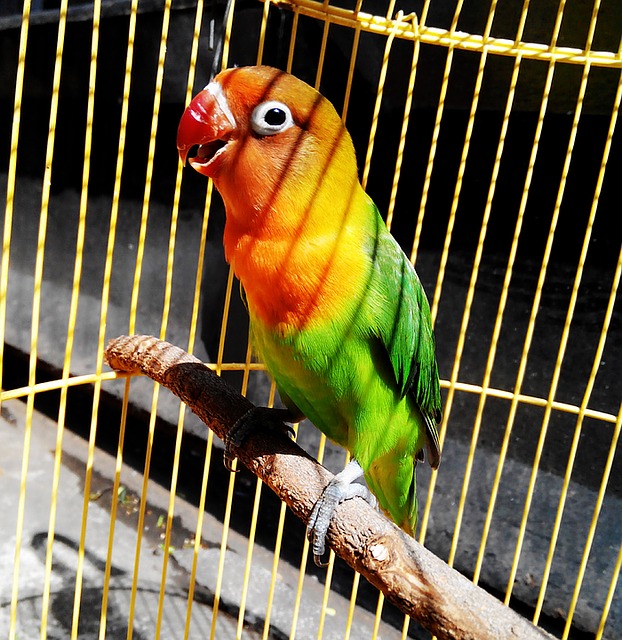Whistling, chirping and making sounds in general is one of the few ways lovebirds can communicate with another party, whether their owners, partner or flock members.
There are a multitude of reasons why lovebirds whistle so, below I’ll be going over 5 normal/positive reasons why and 2 negative reasons why your lovebird would be whistling.
- When They’re Happy And Excited
- When Someone They Like Is In Their Presence
- If They’re Looking For Attention
- As A Way To Communicate With Others
- To Attract A Mate
- When They’re Scared
- Grieving The Loss Of A Loved One
7 Reasons Why Lovebirds Whistle
1. When They’re Happy And Excited
When a lovebird is happy, they can express this emotion in a number of ways. They could crawl on your shoulder and go for a little cuddle, nod their head whilst on your shoulder and of course produce sounds in the form of whistles and chirps to show you that they’re happy.
They could also be happy over a new toy, a new cage, food being brought to them, other birds singing outside stimulating their instincts to join in and also whistle to other forms of music they actually like.
Lovebirds are most excited and vocal in the morning or late afternoons where you will find them whistling throughout the day. Sunlight and noises that stimulate them are both equally contributory as your lovebird will be provided with more energy to happily chirp throughout the earlier hours.
2. When Someone They Like Is In Their Presence
If you and your lovebird have a tight bond, there’s a good chance they will start whistling the moment you walk in, sometimes even jumping towards the front of the cage to alert you of their presence.
I’ve noticed with my lovebirds that they are most vocal when I walk in and whistle at them. I guess you could say that may be the trigger but, even without a whistle they still seem excited to see me.
3. If They’re Looking For Attention
Lovebirds will chirp or whistle out of boredom as well as excitement so, if you’re lovebird is being extra noisy due to the lack of fun things to do, you could bring them a few goodies to keep them satisfied which should at the same time decrease the amount they’ll be whistling.
Other than boredom lovebirds can also whistle if they want you to look their way.
This is because lovebirds and most parrots in general require a good amount of attention from their owners for bonds to be built (between 3 – 5 hours) so, it’s normal for these little parrots to whistle when seeking your attention.
Singular birds may require even more attention as they don’t have a partner to communicate with therefore, you’ll notice their sound output will be a lot more than pairs.
4. As A Way To Communicate With Others
Whistling is one of the only ways lovebirds can communicate with each other so, it makes sense they would use it to communicate with its peers or their owner.
This can range from a variety of chirps whether quick quiet ones when resting or louder more piercing ones when they’re really trying to get your attention.
5. To Attract A Mate
Lovebirds will use their whistle to garner the attention of a potential mate but, it’s not as aggressive a whistle but a more click, click chirp.
There are other acts lovebirds will do to try and win over another’s affection and in some cases their owners but, short chirps are one of the common methods they use to talk to someone they’re interested in.
6. When They’re Scared
If a lovebird feels threatened or scared due to an unexpected fright or due to an unfamiliar individual trying to grab them, they will chirp and squawk out of fear.
It may sound like their chirps are whistles at first but, over time it will likely turn into a more ear piercing squawk, used in attempt to have the other party retreat.
7. Grieving The Loss Of A Loved One
Animals can grieve in a multitude of ways whether it be on their own, with others, in silence and sometimes by mourning out loud.
Although not all lovebirds will consistently whistle when grieving, this is one action they may do when trying to overcome the loss of a partner, owner etc.
Sometimes, they may even have night frights where they awaken randomly throughout the night or produce small clicks throughout their sleep.
Summary
Whistling is one of the main ways lovebirds express themselves so, it only makes sense that they use their vocal cords to communicate a variety of emotions, whether positive or negative, to others.
Hopefully this article has given you a better idea as to why and when lovebirds will whistle and in turn help you to better understand your little feathered buds intentions when the do.
Amhil Khan, a dedicated nature enthusiast and the founder of BirdsOfTheWild.com, is a passionate advocate for the captivating world of avian wonders. With a deep-seated curiosity about the intricate lives of birds, Amhil’s journey began as a fascination and has evolved into a mission to inspire others to appreciate and protect these magnificent creatures.
Amhil’s love for birds led to the creation of Birds of the Wild, a platform where his expertise in ornithology, coupled with his captivating storytelling, provides readers with an immersive and educational experience. Through his lens and words, he captures the essence of birds in their natural habitats, offering a glimpse into their behaviors, migrations, and the ecosystems they inhabit.

